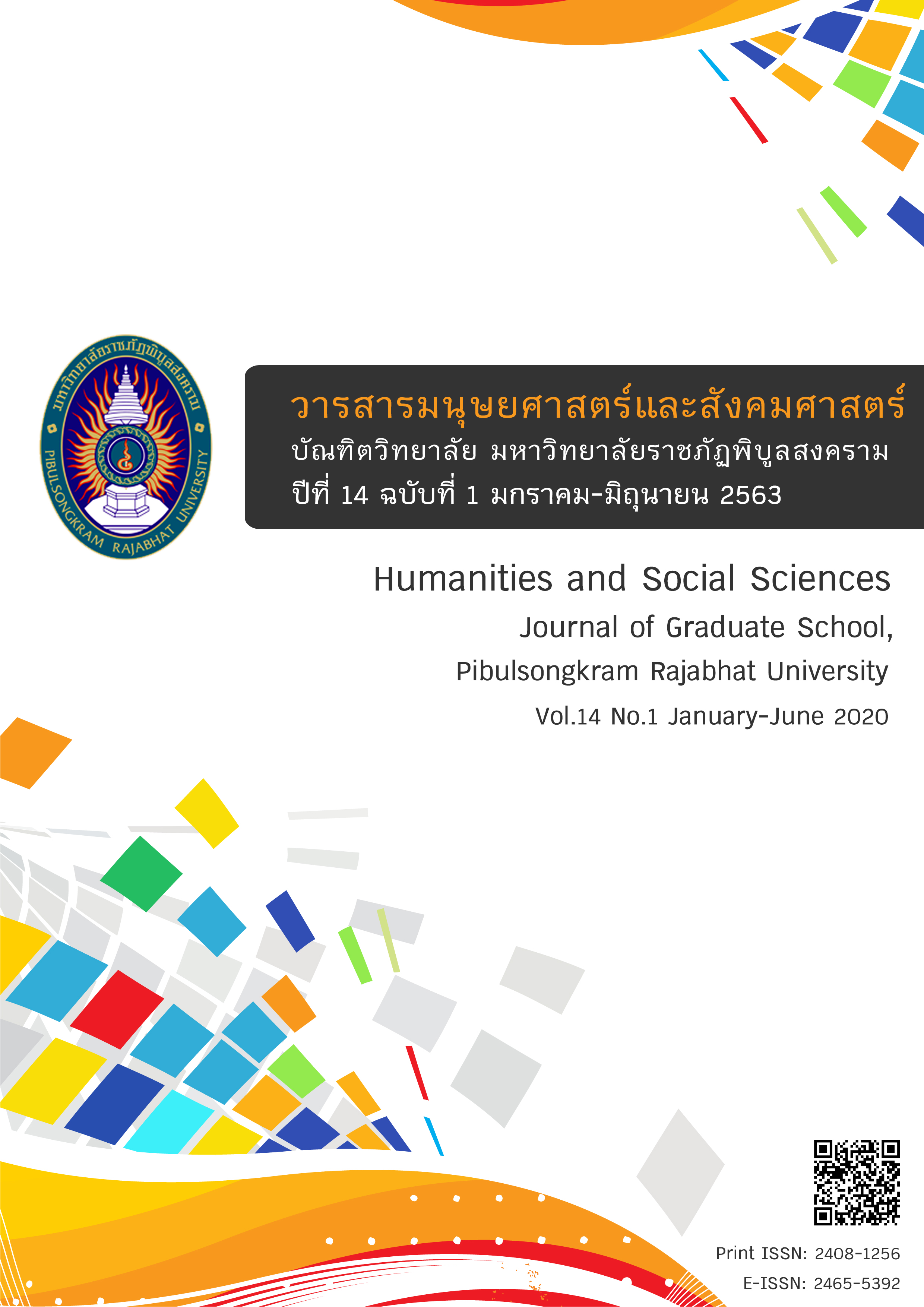Process-Driven Education Technology in schools under the Office of Private Education in Southern Border
Keywords:
Process-driven education technology, Technology education networkAbstract
This research aims (1) to evaluate the need of using technology for teachers’ learning management (2) to develop and evaluate process-driven education technology in schools affiliation of Office of the Private Education Commission in southern border provinces. Target groups are (1) 1 administrator (2) 2 school teachers who were responsible for media and materials (3) 2 teachers of learning areas from 12 schools affiliation of Office of the Private Education Commission in southern border provinces with the total of 60 participants. Research tools were issues of group dialogue questions, evaluation form of using teachers’ skill using technology for learning management, students’ follow-up learning. Data analysis was inductive summary, Means, Standard Deviation, Frequency, Percentages and The Wilcoxon Signed Rank test.The research results were as follows: 1. School teachers' affiliation of Office of the Private Education Commission in southern border provinces needed (1) the aspect of materials and equipment’s : initial development is resolved by using Google Application in order to aligned with the basic materials in schools. (2) the aspect of technology for learning management: the use of Google Application is required in learning management of courses (3) the aspect of training: using school-base training.(4) the aspect of time: the training days are considered as holidays. 2. The process-driven education technology in school affiliation of Office of the Private Education Commission in southern border provinces consisted of concepts and structures of process. These structures were (1) realization (2) courtship (3) commitment 4) action group with steps of PDCA (P: Prepare; D: Develop; C:Check and A: ACT) and 5) network through 5 action plans of 48 hours with a copy of handbook. The evaluations of process-driven in school affiliation of Office of the Private Education Commission in southern border provinces were as follows: the correct principles in the high level, appropriate contexts, useful benefits and possible application in nearly high level to high level. 3. The evaluations of using process-driven in school affiliation of Office of the Private Education Commission in southern border provinces were found that : The means of teachers’ skill using technology for learning management after participating in the process was higher than before participating in the process with the statistical significance at .01. Students’ learning results after using technology for learning management were at level 5 (5.28%), level 4 (46.13%), level 3 (37.32%), and level 2 (11.27%).
References
กระทรวงศึกษาธิการ. (2556). ศธ.จี้ครูปรับบทบาทใหม่ทันกับเทคโนโลยีสอนเด็ก. สืบค้น 29 ตุลาคม 2558, จาก http://www.moe.go.th/.
กฤธยากาญจน์ โตพิทักษ์, วรินธร เบญจศรี, วีนัส ศรีศักดา, จินตนา กสินันท์, เสาวรส ยิ่งวรรณะ, คุณอานันท์ นิรมล และศิริรัตน์ สินประจักษ์ผล. (2559). การพัฒนากระบวนการเรียนรู้เพื่อเสริมสร้างจิตสำนึกรักษ์น้ำของเยาวชนลุ่มน้ำคลองท่าแนะ จังหวัดพัทลุง. สงขลา: มหาวิทยาลัยทักษิณ.
เครือศรี วิเศษสุวรรณภูมิ, ชุมศักดิ์ อินทร์รักษ์ และอนุศักดิ์ ตั้งปณิธานวัฒน์. (2555). การส่งเสริมและพัฒนานวัตกรรมเครือข่าย การเรียนรู้ของครูและบุคลากรทางการศึกษา เพื่อพัฒนาคุณภาพผู้เรียนในสามจังหวัดชายแดนภาคใต้. วารสารปาริชาติ, 25(2), 81-90.
นฤมล นิราธร. (2543). การสร้างเครือข่ายการทำงาน: ข้อควรพิจารณาบางประการ. กรุงเทพฯ: โครงการระหว่างประเทศว่าด้วยการขจัดปัญหาการใช้แรงงานเด็ก.
ปาริชาติ วลัยเสถียร. (2548). (บรรณาธิการ). เครือข่าย: ธรรมชาติ ความรู้ และการจัดการ. พระมหาสุทิตย์ อาภากโร (อบอุ่น) เขียน (พิมพ์ครั้งที่ 2). กรุงเทพฯ: พิสิษฐ์ไทย ออฟเซต.
พิสิฐ เทพไกรวัล. (2554). การพัฒนารูปแบบเครือข่ายความร่วมมือเพื่อคุณภาพการจัดการศึกษาในโรงเรียนประถมศึกษาขนาดเล็ก (วิทยานิพนธ์ปรัชญาดุษฎีบัณฑิต). มหาวิทยาลัยขอนแก่น, ขอนแก่น.
ภัทรวรรธน์ นิลแก้ว บวรวชิญ์. (2559). รูปแบบการพัฒนาเครือข่ายความร่วมมือทางวิชาการของสำนักงานเขตพื้นที่การศึกษาประถมศึกษา สังกัดสำนักงานคณะกรรมการการศึกษาขั้นพื้นฐาน (วิทยานิพนธ์ปรัชญาดุษฎีบัณฑิต). มหาวิทยาลัยบูรพา, ชลบุรี.
มงคล หมู่มาก, อังคณา อ่อนธานี, วารีรัตน์ แก้วอุไร และเอื้อมพร หลินเจริญ. (2559). การพัฒนาหลักสูตรเพื่อเสริมสร้างความสามารถทำวิจัยปฏิบัติการในชั้นเรียนด้วยเครือข่ายการจัดการความรู้สำหรับครู. วารสารศึกษาศาสตร์ มหาวิทยาลัยนเรศวร, 18(1), 1-9.
รสสุคนธ์ มกรมณี. (2557). เรื่องน่าวิจัย: การออกแบบการเรียนรู้เพื่อศตวรรษที่ 21. ใน การประชุมทางวิชาการของคุรุสภา ประจำปี 2557 (น. 10-18). กรุงเทพฯ: สำนักงานเลขาธิการคุรุสภา.
ศศิธร เขียวกอ. (2548). การพัฒนาสมรรถภาพด้านการประเมินสำหรับครูโรงเรียนประถมศึกษาเปรียบเทียบผลการฝึกอบรมระหว่างการฝึกอบรมแบบดั้งเดิมและแบบใช้โรงเรียนเป็นฐาน (วิทยานิพนธ์ครุศาสตรดุษฎีบัณฑิต). จุฬาลงกรณ์มหาวิทยาลัย, กรุงเทพฯ.
สกาวรัตน์ ชุ่มเชย. (2543). รูปแบบการวิจัยปฏิบัติการสำหรับครูโดยใช้โรงเรียนเป็นฐาน (วิทยานิพนธ์ครุศาสตรมหาบัณฑิต). จุฬาลงกรมหาวิทยาลัย, กรุงเทพฯ.
สุมน อมรวิวัฒน์. (2533). สมบัติทิพย์ของการศึกษาไทย. กรุงเทพฯ: จุฬาลงกรณ์มหาวิทยาลัย.
สุวิมล ว่องวาณิช. (2546). การพัฒนาครูโดยใช้โรงเรียนเป็นฐาน. กรุงเทพฯ: จุฬาลงกรณ์มหาวิทยาลัย.
เสริมศักดิ์ วิศาลาภรณ์. (2550). รูปแบบการบริหารจัดการศึกษาในจังหวัดชายแดนใต้ (รายงานวิจัย). กรุงเทพฯ: สำนักวิจัยและพัฒนาการศึกษา สำนักงานเลขาธิการสภาการศึกษา.
สํานักงานเลขาธิการสภาการศึกษา. (2547). กรณีตัวอย่างรูปแบบการวิจัยและพัฒนาทั้งโรงเรียนของนักวิจัยในพื้นที่โครงการปฏิรูปการเรียนรู้เพื่อพัฒนาคุณภาพผู้เรียน. กรุงเทพฯ: สำนักงานเลขาธิการสภาการศึกษา.
สํานักงานเลขาธิการสภาการศึกษาและมูลนิธิสุข-แก้ว แก้วแดง. (2554). รายงานการวิเคราะห์เจาะลึกการประเมินคุณภาพการศึกษารอบที่ 2 (ปี 2549-2553) โรงเรียนในพื้นที่จังหวัดชายแดนภาคใต้. กรุงเทพ: สำนักงานเลขาธิการสภาการศึกษา.
Anderson, J. (2010). ICT transforming education a regional guide. Thailand: UNESCO Bangkok.
Downloads
Published
How to Cite
Issue
Section
License
Any articles or comments appearing in the Journal of Humanities and Social Sciences, Rajabhat Phibulsongkram University, are the intellectual property of the authors, and do not necessarily reflect the views of the editorial board. Published articles are copyrighted by the Journal of Humanities and Social Sciences, Rajabhat Phibulsongkram University.









